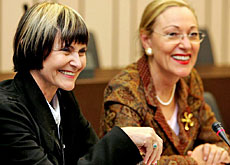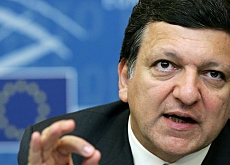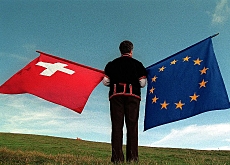Bern and Brussels agree to disagree

Switzerland and the European Union are sticking to their different positions over the controversial issue of corporate tax privileges offered by Swiss cantons.
Swiss Foreign Minister Micheline Calmy-Rey and EU Commissioner for External Relations Benita Ferrero-Waldner decided on Thursday that solutions had to be found at the political and judicial levels.
Talks in Brussels – described as “pleasant and constructive” – ended with a declaration of the two sides’ different positions.
Privileges offered to companies by some cantons violate the 1972 free trade agreement between Bern and Brussels, according to the EU Commission.
Switzerland, which is not a member of the EU, sees no connection between the agreement, which covers trade, and tax practices.
Tax sovereignty
Calmy-Rey said it was an important political question of tax sovereignty.
Ferrero-Waldner described the issue as a “hot potato” which called for solutions to be worked out. However, she made no reference as to what they might be.
She underlined that Brussels had nothing against tax competition as long as it was “just and non-discriminatory”.
The dispute centres on how much Switzerland is integrated into the EU’s single market and to what extent it has to take EU regulations on board.
The speaker of the Swiss mission in Brussels, Hanspeter Mock, said Ferrero-Waldner welcomed the positive outcome of last Sunday’s referendum in Switzerland, which confirmed a SFr1 billion ($800 million) contribution to the ten new EU member states.
Strengthening relations
Ferrero-Waldner described acceptance of the Eastern Europe Cooperation Act as a good basis for strengthening and developing bilateral relations.
Future negotiations on bilateral ties could include liberalisation of the electricity market, Swiss participation in the Galileo satellite programme and renewal of agreements on research and the media.
Mock also said there was mention of a general framework agreement that would include all the bilateral accords.
Calmy-Rey said that implementation of the treaties in the second set of accords was for her a very high priority.
After her talks in Brussels, Calmy-Rey flew to the Finnish capital, Helsinki, where she was scheduled to meet her Finnish counterpart Erkki Tuomioja.
Until the end of the year Finland holds the EU Presidency.
swissinfo with agencies

More
EU bilateral accords
Selected business tax rates:
Japan 40.7%, US 40%, Germany 38.3%, Switzerland 21.3%, Republic of Ireland 12.5%, Cyprus 10%
Selected cantonal rates:
Obwalden 13.1%, Schwyz 15.6%, Zug 16.4%, Zurich 21.3%, Graubünden 29.1%
The European Commission first raised the issue of Swiss cantonal tax competition in September 2005.
The EC believes such competition breaks the terms of the free trade agreement it signed with Switzerland in 1972.
Despite several meetings with the Swiss authorities, an agreement has not yet been reached.

In compliance with the JTI standards
More: SWI swissinfo.ch certified by the Journalism Trust Initiative



You can find an overview of ongoing debates with our journalists here. Please join us!
If you want to start a conversation about a topic raised in this article or want to report factual errors, email us at english@swissinfo.ch.